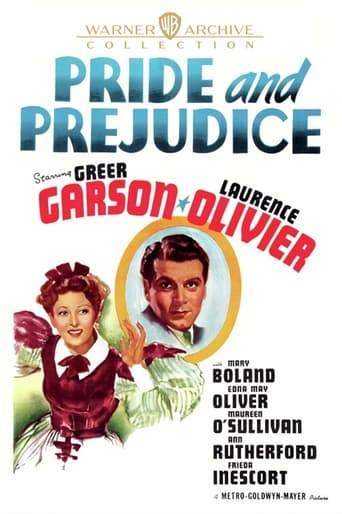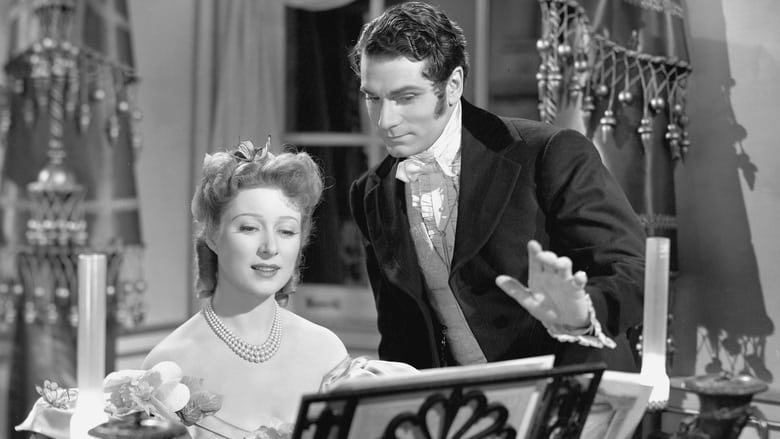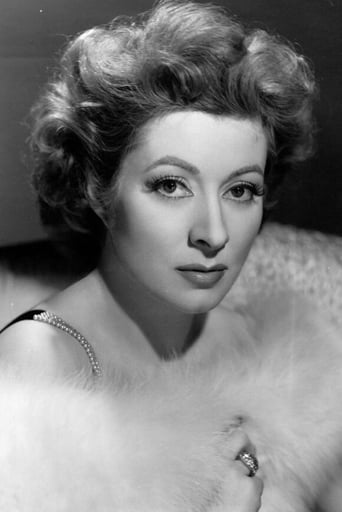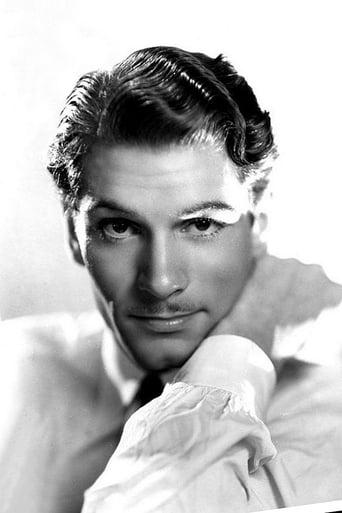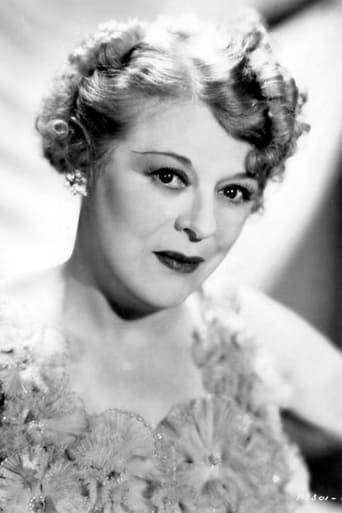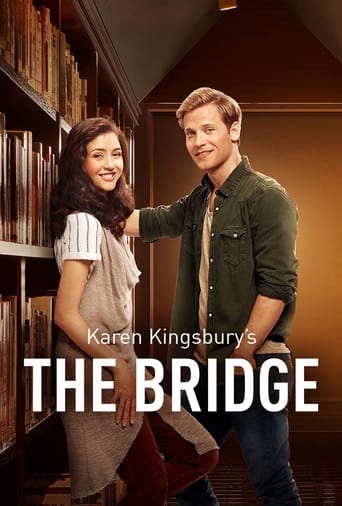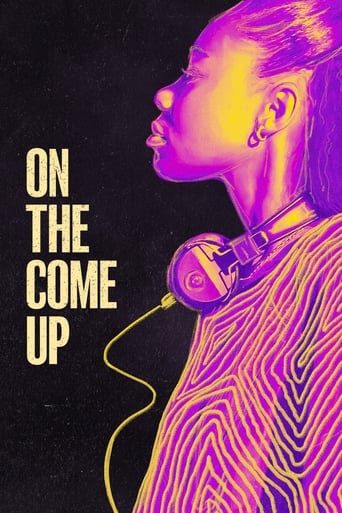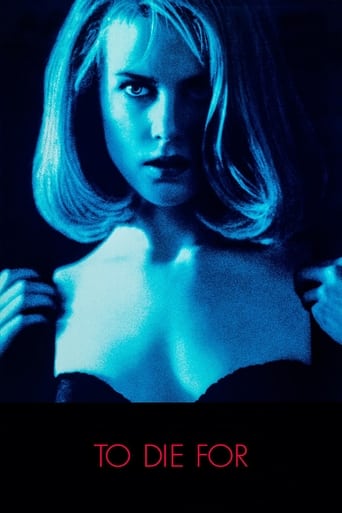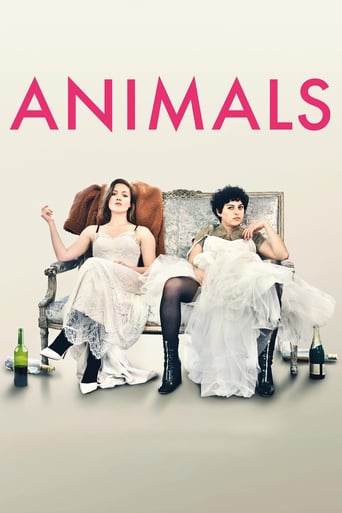Pride and Prejudice (1940)
Mr. and Mrs. Bennet have five unmarried daughters, and Mrs. Bennet is especially eager to find suitable husbands for them. When the rich single gentlemen Mr. Bingley and Mr. Darcy come to live nearby, the Bennets have high hopes. But pride, prejudice and misunderstandings all combine to complicate their relationships and to make happiness difficult.
Watch Trailer
Cast


Similar titles
Reviews
Purely Joyful Movie!
A lot of fun.
Simple and well acted, it has tension enough to knot the stomach.
It was OK. I don't see why everyone loves it so much. It wasn't very smart or deep or well-directed.
The 1940 "Pride and Prejudice" is a good, if 'Hollywoodized' version of Jane Austin's famous novel. Greer Garson is at least 15 years too old to play Elizabeth Bennet, the film is set 30 years later than the novel (supposedly to allow use of the sumptuous gowns left over from "Gone with the Wind") and the ending has been sweetened. Never-the-less, the film remains quite enjoyable. Although not really looking the ingénue, Garson is quite good, as is Olivier, who plays the misunderstood Mr. Darcy. The rest of the cast are fine, especially Ed Quinn as Mr. Bennet. All in all, a good version of the oft-filmed romance.
Pride and Prejudice (1940): Dir: Robert Z. Leonard / Cast: Greer Garson, Lawrence Olivier, Mary Boland, Edna May Oliver, Maureen O'Sullivan: Overrated contrived drivel about status, class and wealth. It is one of those opposites attract romantic films where one hates the other while viewers already know what these airheads fail to realize. And listening to Greer Garson accuse Lawrence Olivier of being proud, while he counters about her being a tight ass quickly turns the film into a corny manipulative chore to sit through. Director Robert Z. Leonard does his best and he is backed by superb sets and art direction as well as appealing locations. The screenplay however jerks us around with Greer refusing to dance with Olivier and vice versa before they embrace with that final shot long kiss that is gut wretchingly predictable at best. In supporting roles there is Mary Boland who apparently wants her daughters not only to marry, but to do so in a wealthy family. She spends much of the film feeling ill and making viewers feel the same. Then there is Edna May Oliver as Lady Catherine who comes off as stuck up and arrogant. Maureen O'Sullivan plays Garson's sister and she is about as bland as the rest of the cast here. The point of the film addresses our finger-pointing methods of distinguishing a person's worth but the real oversight is the popularity of this undeserving charade. Score: 5 / 10
I recently watched again this film version of Jane Austin's classic novel. Of course, by now, I have had the opportunity to watch all the later versions as well. This 1940 film and the 2005 film might best be viewed as adaptations of the Austen story, based more on the modern mores and culture of the time each film was made. That excuses the departure from the settings, clothing, manners, and mores of the early 1800s and the landed gentry of England. Those were the substance of Austen's great book, and she beautifully put them under a huge microscope for all to see in her novel. I am most grateful to the BBC for its 1980 and 1995 mini-series that so faithfully and painstakingly transposed the printed pages onto film. Hollywood often alters, revises, rewrites and sometimes completely changes stories or their outcomes. Sometimes it makes for better movies. Sometimes, great reductions are needed just to get a story on film. So, I understand that. And, we movie buffs can take or leave the results. As some of the IMDb reviews indicate on the 2005 movie, there is an audience out there that likes the modern-day adaptation. I too enjoyed the 2005 film. It is truer to the times and culture than this 1940 film. But it omits or drastically condenses significant parts of Austen's story—of necessity, no doubt, to fit the movie length. For the much better and complete telling of the story, viewers should watch either or both of BBC TV minis-series. I'm in the camp of people who really enjoy the wit and humor of clever dialog, accompanied by wonderful expressions to match, and the poking and jabbing at the foibles and follies of cultures. Those things are the essence and value of this story. Through it, Austin explores and exploits those very time-specific mores of English society. She does it with wonderful irony, satire and spoofing. So, when those things are altered significantly, as they are in this cramped version, we are left with something else. A soap opera of sorts, perhaps? Or maybe even a romantic comedy? But it certainly is not the wit, clever story-telling and wisdom of Jane Austen. This 1940 film has a cast of great actors. But many are too old for the roles they play. The costumes are only the start of the failings of this film – from the opening scene. But the script and direction are its biggest failings. One reviewer (vincentlynch-moonoi from the U.S.), on 3 July 2012, wrote: "I confess – I don't get it." I think that honestly reflects the script. For anyone who doesn't know the story, too many things in the movie are left dangling or have just piecemeal references. The plot is too disconnected at times. I won't go into more detail on the many miscues in this adaptation. Two other reviewers nail these very well – Ivan-166 from Australia, 16 August 2006; and Keith-moyes from the U.S., 21 November 2006. So, while some people today may enjoy this 1940 film as a light comedy- romance of sorts, we don't know if they also would be interested in reading Austen's novel or watching the longer accurate depictions on film. What would be interesting to me would be to see how people rated this film in 1940. How would reviewers have posted comments on IMDb if it were around back then? And what would they have to say?My five stars for this film are for Jane Austen, just for the parts of her great novel that are in this film. And for the cast of wonderful actors of the time who gave it a try with a very poor script and far sub-par direction.
For me, most all films made during the golden age of Hollywood are excellent and compare more than favourably with modern films, but this version of Pride and Prejudice stands out as my favourite version of them all.Let me say this. I love every film version of Jane Austen's seminal work, Pride and Prejudice. It's true that every version has its faults, but it is also true that every version has it's triumphs as well.The 1980 film series is perhaps most accurate. The costumes and demeanor seem most accurate pertaining to late Georgian/Regency England.The 1995 miniseries is by far the most complete, containing just about every facet of the book. Also, Jennifer Ehle is most likely the finest Elizabeth. That distinction might have gone to Greer Garson had she worn a few kilos less Max Factor.The 2005 Keira Knightly version is the most modern and in some ways the most romantic.But for me, despite some glaring changes/omissions, the 1940 version starring Greer Garson and Laurence Olivier is still the best. Ms Garson, despite appearing too old for the part, is absolutely pitch perfect and well captures Elizabeth's humorous nature. In fact, humor is likely this versions strength. Because Pride and Prejudice above all is a humorous look at Regency England and the lifestyle of the middle classes in England at that time, most particularly the Bennet household.Laurence Oliver, the greatest stage actor of the last century or two, and one of the greatest actors who ever lived, is wonderful as Mr. Darcy, if perhaps a tad too arch at times. Portraying a Regency snob is fraught with little traps and unfortunately, Lord Oliver does trip a few times and comes across as a bit prissy. But he is not alone, most other actors attempting Mr. Darcy end up looking a bit fey from time to time as well.David Rintoul, who, in the 1980 version, gives probably the most accurate depiction of Mr. Darcy of them all, is positively cringeworthy from time to time he is almost lady-boy.The only two actors who never seem effeminate in any way in the role of Mr. Darcy, Colin Firth and Matthew MacFadyen, both seem wooden at times, although I love them both in the role. In fact, although I find Matthew the sexiest Mr. Darcy and David Rintoul the most accurate, overall it is probably a tie between Laurence Olivier and Colin Firth with Colin Firth leading by a nose. He has his faults, but the 1995 production is simply too good, and his Mr. Darcy too perfect to be ignored.Say what you will about the superior attention to detail found in today's versions of P&P, the 1940 version positively rocks with the absolute best ensemble work found in any version.Mary Boland as Mrs Bennet captures her addle brained nature and slavish devotion to the marriage of her daughters in fine style and with a silliness not found in any other film version.Edna May Oliver is the quintessential Lady Catherine De Bourgh. I really do not care that the part was slightly rewritten to make her less hateful. The most telling feature of Mrs. De Bourgh's character should be that she is silly, and Ms Oliver captures that with aplomb. Further, Lady Catherine was first and foremost a powerhouse of a woman and that describes Edna May Oliver to a tee.Frieda Inescort is the perfect Caroline Bingley, absolutely chock full of upper crust venom. Caroline is one of the few characters in the book who is not at all silly. She is and should be always the ice goddess, who is unfortunately, a fool who does not realize it. There has never been another Caroline Bingley to compare with Ms. Inescort.Melville Cooper as the silliest character of them all, and perhaps the silliest character ever written, Mr. Collins, is hilarious.Edmund Gwenn is wonderful as Father Bennet if not really English sounding at all.Also of note are Maureen O'Sullivan as the beautiful Jane Bennet, and several others The aforementioned actors were all stage trained and knew how to master a character. This skill truly makes of the ensemble cast in this version a thing of beauty. Oh well, they all are really.There were some of the cast in the 1940 version who were a bit too vanilla for my taste, such as Bruce Lester as Mr. Bingley, and May Beatty as Mrs. Philips.This version of course takes liberties with the book, especially in substituting late Victorian fashion for Regency, and a few other things, but on the whole, I find it amazingly well written and well acted, and absolutely perfectly delineating the point of the novel.

